In Nigeria like in many countries, the COVID-19 outbreak burgeoned into a major crisis, leaving its mark beyond the health hazard consequences. The pandemic brought about immense personal and financial suffering especially for low-income households, communities, businesses and the economy at large.[1] Before the pandemic, Nigeria was already on a sluggish recovery from the recession in 2016, a collapse in crude oil prices and a tapering GDP growth rate of about 2%[2]. The onset of the pandemic therefore posed immense uncertainty and anxiety at all levels.
EFInA, in collaboration with the Financial Sector Deepening Network (FSD Network), commissioned Bankable Frontier Associates (BFA) to conduct a scenario analysis exercise to identify how digital financial services could enable resilience and support the recovery of the livelihoods of low-income households and their businesses. With the growing uncertainty and anxiety within the financial services ecosystem, there were fears that the financial inclusion efforts that had hitherto been employed would be eroded and the numbers reversed if there was no intervention. This paper outlines specific recommendations for how Nigeria can use digital financial services to facilitate COVID-19 recovery.
The scenarios analysis exercise expanded on four personas in Nigeria, developed by the Human Account[3] project, to understand what could happen to their lives during the COVID-19 crisis and economic recovery.
The persona trajectories: Pictures of their possible futures
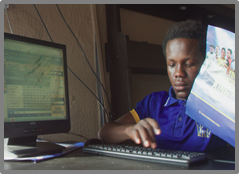
Yomi is a resilient character; a committed saver, he was well prepared to face the crisis in his personal life. Nonetheless, the reduction in demand hit his small business hard forcing him to release his employee. He was also affected by rising food prices and had to eat into his savings. Yomi, being digitally literate, already had a bank account, which played a major role in shaping his recovery. Yomi was able to quickly diversify his income by becoming a financial services agent and a delivery driver for a logistics platform.
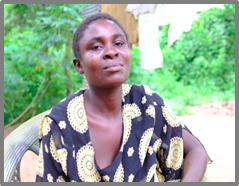
Zainab is a strong individual who is coping with hardship and poverty, bringing up 5 children alone in an insecure rural location after her husband died. COVID-19 disrupted the supply of subsidized fertilizer, so her harvest was poor, and the market and transport disruption also made it harder to sell any small surplus. With no money to buy seeds or fertilizer for the next planting season, Zainab’s income dropped drastically, and she and her family struggled to have enough to eat. The disrupted national vaccination programmes, increased risks, and increased costs put her children at risk of preventable diseases, and the threat of insecurity.
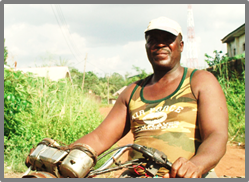
Chigozie is an enterprising small-scale farmer in a fertile area, with additional income from masonry work and his wife’s salary – as she is a teacher. Before COVID-19, life was good, and they were saving to build a house. COVID-19 stopped his masonry income and his wife’s salary was delayed as falling oil revenues restricted state spending. Subsidized farm inputs were disrupted, harvests were smaller and access to markets was restricted for him and his buyers. He used his savings to buy fertilizer privately at a high cost, to try to maintain future productivity.

Victoria is an enterprising young woman with an optimistic and dynamic outlook. Victoria immediately lost her job at a salon as personal services became impossible during the immediate COVID-19 crisis. She quickly drew down her savings and went into debt to support herself. She found it difficult to repay as the recession continued. Given her enterprising spirit, digital skills and location in Lagos, Victoria took advantage of social media digital marketing to get back into business as the recovery started to take hold.
How might we ensure that digital financial services enable the resilience and support the recovery of the likes of Yomi, Zainab, Chigozie and Victoria?
For the effective deployment of digital financial services to support the above personas, it is imperative to consider the pandemic as a once in a generation opportunity for reforms in the Nigerian financial sector, supporting the uptake of DFS.
1. Conditional Cash Transfer (CCT) Programme Policy reviews in favour of digitization for improved effectiveness
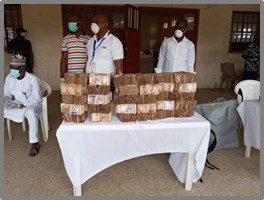
The need to scale up social protection in response to COVID-19 in Nigeria is recognized as critical to lessen the impact of the pandemic. Digitization of the programmes provides a basis to achieve scale, ensuring that the programmes run efficiently, at minimal costs while being effective. There is a need to review CCT policies that require physical verification of payments by programme officials as they inhibit digitization efforts. People like Zainab should be eligible for conditional cash transfer (CCT) programmes, but without significant programme digitization efforts, well deserving beneficiaries may not be able to access funds.
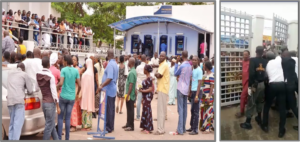
Customers besiege banks on the first day of the partial lifting of COVID-19 lockdown
2. Harmonized licensing regime for fintech firms to facilitate easier deployment of services
In the current situation of economic uncertainty, some of the Venture Capital and Private Equity firms have reduced the amount of funding going to fintech entities as they seek safer investments.[1] This may lead to operational strains in developing DFS solutions for the identified needs of the personas.
There is also an increasing demand for cash as a “safe asset” among the personas as they prepare to weather the difficult days ahead, as witnessed during the initial easing of the lockdown in major cities as people rushed to withdraw funds. This may affect financial services providers including fintech firms that offer savings products. Such providers may be compelled to add complementary products e.g. like micro insurance, investment or credit solutions to their offerings requiring additional costs
Harmonize the licenses, especially for fintech firms operating under the purview of multiple regulatory bodies, e.g. SEC approved savings and investment fintech firms that need to access NIBSS infrastructure for their payment processes. A harmonized licensing regime will mean that an entity licensed by SEC should be able to easily access required infrastructure without undergoing extensive additional approval processes, based on meeting pre-defined cross-cutting criteria.
3. Proportionate licensing and requirements for large scale and early-stage fintech firms to provide an open and level playing field for DFS deployment
Startups are often expected to meet the same requirements as the much larger firms. Given that most fintech firms are still attempting to access sizeable markets, especially regarding reaching the unbanked or underbanked, and have limited resources, proportionality and scale can be applied to licences and capital requirements to provide an open and level playing field for DFS deployment.
4. Clarification of legal frameworks to promote the uptake of digital platforms by MSMEs
Digital platforms are emerging as a key pillar in the fight against COVID-19, from marketplaces to telemedicine, deliveries, etc. This is because they have increasingly helped in avoiding in-person contact and therefore reduced the risk of infections. They have now created an emerging need for digital payment infrastructure.
Here, governments can make it easier for businesses and households to connect to the digital economy through these platforms. Legal frameworks surrounding online remote services delivery can be clarified. For instance, government can suspend the proposed 5% value-added tax (VAT) for all local online retail transactions, which leads to additional costs to the small business owners like Yomi, making the services unaffordable to customers. In the current COVID-19 impacted sluggish economy, many Nigerian MSMEs and consumers are incredibly sensitive to any price changes and would therefore not access these services.
5. Support the scale of the digital foundational ID to accelerate digital inclusion
Nigeria already has the NIN as the foundational ID. There is a need to support the scale of this ID to accelerate digital financial inclusion. The COVID-19 pandemic highlights how countries with platforms such as digital ID systems, digital payment systems and integrated social protection information ecosystems can quickly scale up existing or new social protection programs, quickly and effectively making emergency cash transfers to vulnerable groups.
6. Revitalize the specialized financial institutions/development finance institutions for improved credit for MSMEs
Development finance institutions in Nigeria are set up to provide appropriate finance to sectors. The pandemic presents an opportunity to revitalize the sector perhaps in partnership with the digital financial service providers that are more nimble and closer to the customers as sustainable finance has a role to play in mobilizing the response to COVID-19.
Conclusion
From the scenario analysis, digital financial services form efficient crisis response tools crucial in mitigating the negative impacts of the pandemic. The resilience of the personas is demonstrated by the ability to stabilize consumption and how well they can identify opportunities. When access to daily relevant digital financial services is enabled, and the people in the low-income segments use these services, their economic productivity is improved – they ‘survive’. The pandemic scope and the response to it have emphasized the importance of digital inclusion, particularly for the most vulnerable. We are hopeful that regulators and other stakeholders in the financial services sector will promote various digital financial tools that improve the survival of the vulnerable. This is a crucial time, a once in a generation opportunity for policy reforms and strategic innovation in the Nigerian financial sector!
Development Financial Institutions include the Bank of Agriculture, Bank of Industry, Development Bank of Nigeria Plc, Federal Mortgage Bank of Nigeria, Nigeria Export Import Bank and The Infrastructure Bank
References
[1] COVID-19 Impact on Financial Lives and Livelihoods in Nigeria report by EFInA, May 2020
[2] Article IV Consultation discussions on Nigeria’s economy by IMF, February 2020
[4] Fintech Landscape and Impact Assessment Study, EFInA, 2020
[5] Development Financial Institutions include the Bank of Agriculture, Bank of Industry, Development Bank of Nigeria Plc, Federal Mortgage Bank of Nigeria, Nigeria Export-Import Bank and The Infrastructure Bank


